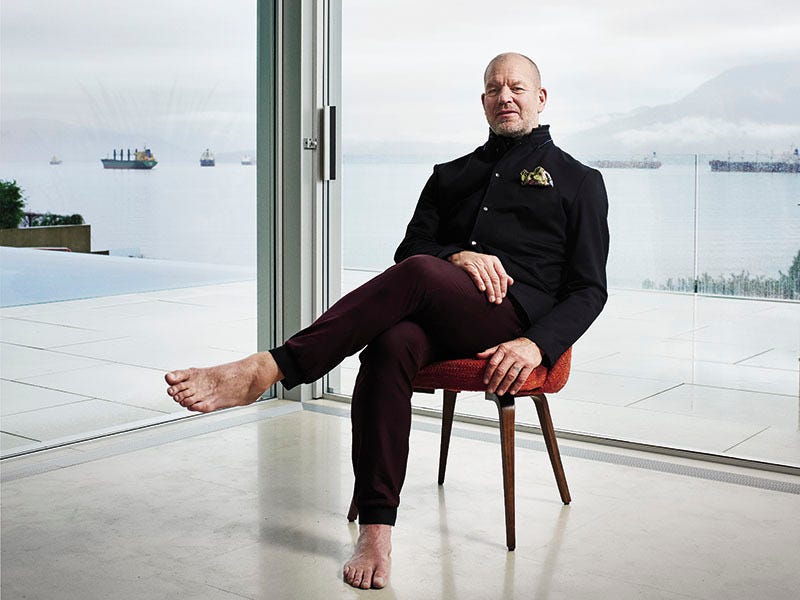What It Takes to Win: Chip Wilson redefining an Industry
[Sponsored Ad]
I’ve been using Ketone-IQ to sharpen my mental focus, sustain clean energy, and keep my brain firing on all cylinders throughout the day and after speaking with the team, they’ve agreed to give you an exclusive 30% off your order: Grab yours here.
Welcome back to another Creators Blueprint, where we talk about the people who set trends.
The ones who see a gap, take a risk, and end up creating something that changes the way we live, shop, or even get dressed.
Now think about your favourite workout gear. The stuff you reach for without thinking whether you’re hitting the gym running errands grabbing a coffee heading to the airport or just chilling at home. Now picture a time when that didn’t exist when gym clothes were just for the gym and nothing else.
That’s where today’s story begins.
A Leap Into the Unknown
When Chip started Lululemon in 1998, he wasn’t some newbie trying his luck. He had already built and sold Westbeach Snowboard Ltd., a brand that specialized in surf and snowboard gear. He had the money to take it easy, but easy was never his style. Instead, he went all in on a crazy idea,
yoga pants that weren’t just comfortable but stylish, something women would actually want to wear beyond the studio.
At that time, yoga was just starting to take off in North America, but the clothing options? Pretty much nonexistent. Chip saw the gap, and instead of waiting for someone else to fill it, he took the risk.
Lesson #1: Big wins start with bold moves. If you’re waiting for the “perfect time,” you’re already late.
Innovation Beyond Fabric
Chip wasn’t just selling leggings, he was redefining them. Back then, activewear was all about cotton, which soaked up sweat and felt gross after a workout. So, he came up with Luon, a high-performance fabric that was moisture-wicking, flexible, and comfortable. A total game-changer.
But here’s where he really flipped the script: Lululemon stores weren’t just stores. They became experiences. Yoga classes, workshops, community events, people didn’t just shop there, they belonged there. The brand wasn’t just about selling clothes, it was about creating a lifestyle.
Lesson #2: Don’t just sell a product, sell an experience. If people feel emotionally connected to what you’re building, they won’t just buy from you, they’ll believe in you.
Culture as a Competitive Advantage
Most companies focus on sales. Chip focused on people. Lululemon employees weren’t just sales associates, they were “educators.” They didn’t just push products, they understood the customers, connected with them, and built real relationships.
Inside the company, it wasn’t just about work, it was about growth. Employees were encouraged to set personal goals, not just professional ones. It created an atmosphere where people wanted to do their best, not because they had to, but because they wanted to.
Lesson #3: Culture isn’t an HR thing, it’s a business strategy. A motivated team will take your brand further than any marketing budget ever could.
Facing Adversity Head-On
Every great entrepreneur gets tested, and for Chip, that test came in 2013. Lululemon had to recall an entire batch of yoga pants because they were too sheer. Major PR disaster. But what really shook things up was Chip’s comment that the pants weren’t suitable for certain body types. The internet exploded. The backlash forced him to step down as chairman.
For a lot of people, that would’ve been the end. Not Chip. He owned his mistakes, apologized, and kept pushing forward. Instead of letting failure define him, he used it to grow.
Lesson #4: Setbacks aren’t the end, they’re part of the process. If you’re not failing, you’re not pushing hard enough.
From Founder to Legacy Builder
After leaving Lululemon, Chip didn’t just disappear. He wrote Little Black Stretchy Pants, a brutally honest memoir about his journey. He kept investing, kept innovating, and most importantly, kept inspiring.
Lululemon is now a multi-billion-dollar brand, but at its core, it started with one guy who saw something the rest of the world didn’t. He wasn’t afraid to challenge the norm, take risks, and make mistakes along the way.
Your Takeaway
If you’re an entrepreneur, or just someone trying to do something different, Chip’s story should be a wake-up call.
See beyond what exists. If you wait for permission to innovate, you’ll always be behind.
Create experiences, not just products. Make people feel something.
Build a culture that fuels growth. Your team is your secret weapon.
Don’t fear failure. It’s just another step toward success.
Dare to redefine your industry. Dare to challenge the norms. Dare to do the impossible.
Because that’s where greatness lives.
Until next time, keep building.



